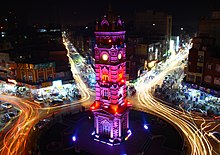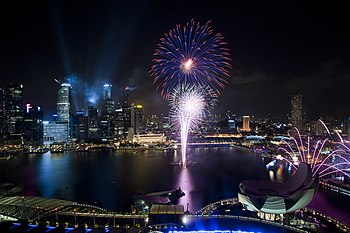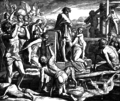The Cities Portal

A city is a human settlement of a notable size. The term "city" has different meanings around the world and in some places the settlement can be very small. Even where the term is limited to larger settlements, there is no universally agreed definition of the lower boundary for their size. In a more narrow sense, a city can be defined as a permanent and densely settled place with administratively defined boundaries whose members work primarily on non-agricultural tasks. Cities generally have extensive systems for housing, transportation, sanitation, utilities, land use, production of goods, and communication. Their density facilitates interaction between people, government organizations, and businesses, sometimes benefiting different parties in the process, such as improving the efficiency of goods and service distribution.
Historically, city dwellers have been a small proportion of humanity overall, but following two centuries of unprecedented and rapid urbanization, more than half of the world population now lives in cities, which has had profound consequences for global sustainability. Present-day cities usually form the core of larger metropolitan areas and urban areas—creating numerous commuters traveling toward city centres for employment, entertainment, and education. However, in a world of intensifying globalization, all cities are to varying degrees also connected globally beyond these regions. This increased influence means that cities also have significant influences on global issues, such as sustainable development, climate change, and global health. Because of these major influences on global issues, the international community has prioritized investment in sustainable cities through Sustainable Development Goal 11. Due to the efficiency of transportation and the smaller land consumption, dense cities hold the potential to have a smaller ecological footprint per inhabitant than more sparsely populated areas. Therefore, compact cities are often referred to as a crucial element in fighting climate change. However, this concentration can also have significant negative consequences, such as forming urban heat islands, concentrating pollution, and stressing water supplies and other resources. (Full article...)
Selected city -
Rome (Italian and Latin: Roma, Italian: [ˈroːma] ⓘ) is the capital city of Italy. It is also the capital of the Lazio region, the centre of the Metropolitan City of Rome Capital, and a special comune (municipality) named Comune di Roma Capitale. With 2,860,009 residents in 1,285 km2 (496.1 sq mi), Rome is the country's most populated comune and the third most populous city in the European Union by population within city limits. The Metropolitan City of Rome, with a population of 4,355,725 residents, is the most populous metropolitan city in Italy. Its metropolitan area is the third-most populous within Italy. Rome is located in the central-western portion of the Italian Peninsula, within Lazio (Latium), along the shores of the Tiber. Vatican City (the smallest country in the world) is an independent country inside the city boundaries of Rome, the only existing example of a country within a city. Rome is often referred to as the City of Seven Hills due to its geographic location, and also as the "Eternal City". Rome is generally considered to be the cradle of Western civilization and Western Christian culture, and the centre of the Catholic Church.
Rome's history spans 28 centuries. While Roman mythology dates the founding of Rome at around 753 BC, the site has been inhabited for much longer, making it a major human settlement for almost three millennia and one of the oldest continuously occupied cities in Europe. The city's early population originated from a mix of Latins, Etruscans, and Sabines. Eventually, the city successively became the capital of the Roman Kingdom, the Roman Republic and the Roman Empire, and is regarded by many as the first-ever Imperial city and metropolis. It was first called The Eternal City (Latin: Urbs Aeterna; Italian: La Città Eterna) by the Roman poet Tibullus in the 1st century BC, and the expression was also taken up by Ovid, Virgil, and Livy. Rome is also called "Caput Mundi" (Capital of the World). (Full article...)Did you know -
- ... that Gloria Rojas, one of the first Latina broadcast journalists in New York City, helped launch the career of Geraldo Rivera?
- ... that the Neil Simon Theatre, a New York City landmark, was the first Broadway theater renamed after a living playwright?
- ... that at 23, Roman Mejia reached the rank of principal dancer at the New York City Ballet, where his father had also danced?
- ... that the 2024 Hillhead by-election was the first by-election won by the Scottish Green Party?
- ... that at New York City's Apollo Theater, amateurs could be swept off the stage?
- ... that before the Fulton Street station was renovated in the 2010s, a New York Times reporter said the station "might be a good spot for M. C. Escher to set up an easel"?
Related portals
Related WikiProjects

Faisalabad ( /fɑːɪsɑːlˌbɑːd/; Punjabi, Urdu: فیصل آباد, Punjabi pronunciation: [fɛːsə̆ləˌbäːd]; Urdu pronunciation: [fɛːsˈlɑˌbɑːd] ⓘ), formerly known as Lyallpur (Punjabi, Urdu: لائل پور), is the second largest city and industrial centre of the Pakistani province of Punjab. It is a metropolitan city of Pakistan and the third largest and populous city in Pakistan, with an estimated population of 3.7 million in 2023 with the growth rate of 2.37%. It is situated in the north-east of the country, lying between the plains of the Ravi and Chenab River. Faisalabad is one of Pakistan's wealthiest and most industrialized city, the largest industrial hub and second largest city of the wider Punjab region.
Historically one of the largest villages of Punjab, Lyallpur was one of the first planned cities within British India, it has long since developed into a cosmopolitan metropolis. Faisalabad was restructured into city district status; a devolution promulgated by the 2001 local government ordinance (LGO). The total area of Faisalabad District is 5,856 km2 (2,261 sq mi) while the area controlled by the Faisalabad Development Authority (FDA) is 1,326 km2 (512 sq mi). (Full article...)Selected article -

Urban sociology is the sociological study of cities and urban life. One of the field’s oldest sub-disciplines, urban sociology studies and examines the social, historical, political, cultural, economic, and environmental forces that have shaped urban environments. Like most areas of sociology, urban sociologists use statistical analysis, observation, archival research, census data, social theory, interviews, and other methods to study a range of topics, including poverty, racial residential segregation, economic development, migration and demographic trends, gentrification, homelessness, blight and crime, urban decline, and neighborhood changes and revitalization. Urban sociological analysis provides critical insights that shape and guide urban planning and policy-making.
The philosophical foundations of modern urban sociology originate from the work of sociologists such as Karl Marx, Ferdinand Tönnies, Émile Durkheim, Max Weber and Georg Simmel who studied and theorized the economic, social and cultural processes of urbanization and its effects on social alienation, class formation, and the production or destruction of collective and individual identities. (Full article...)General images -
Topics
List articles
Subcategories
Associated Wikimedia
The following Wikimedia Foundation sister projects provide more on this subject:
-
 Commons
Commons
Free media repository -
 Wikibooks
Wikibooks
Free textbooks and manuals -
 Wikidata
Wikidata
Free knowledge base -
 Wikinews
Wikinews
Free-content news -
 Wikiquote
Wikiquote
Collection of quotations -
 Wikisource
Wikisource
Free-content library -
 Wikiversity
Wikiversity
Free learning tools -
 Wiktionary
Wiktionary
Dictionary and thesaurus
-

-

-

-

-
Random portal
Purge server cache





























